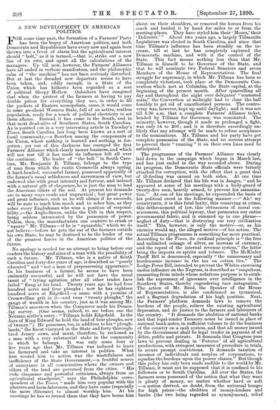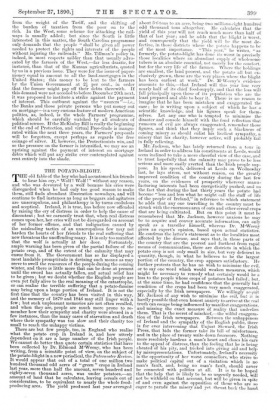A NEW DEVELOPMENT IN AMERICAN POLITICS. F OR some time past,
the formation of a Farmers' Party has been the bogey of American politics, and both Democrats and Republicans have every now and again been thrown into a fever of alarm lest the agricultural interest should "bolt," as it is termed,—that is, strike out a new line of its own, and upset all the calculations of the managers. Up till now, however, the Farmers' Alliances have all ended in verbose manifestoes, and the philosophic calm of "the machine" has not been seriously disturbed. But at last the dreaded new departure seems to have been taken, and, oddly enough, in a State of the Union which has hitherto been regarded as a sort of political Sleepy Hollow. Onlookers have imagined that when the protest of the farmers at having to pay double prices for everything they use, in order to fill the pockets of Eastern monopolists, came, it would come in some go-ahead Western State, full of an active, restless population, ready for a touch of political electricity to set them aflame. Instead, it has come in the South, and in that most dead-alive of Southern States, South Carolina. As is pointed out in a very interesting article in Tuesday's Times, South Carolina has long been known as a sort of fossil community,—a Bourbon among the components of the Union, where nothing is learned and nothing is for- gotten: yet out of this darkness has emerged the first Farmers' Alliance which clearly means business, and which will not rest till it has made its influence felt all over the continent. The leader of "the bolt" in South Caro- lina, Mr. Benjamin R. Tillman, belongs to the type of man from which the rustic Cromwells always spring. A hard-headed, successful farmer, possessed apparently of the farmer's usual selfishness and narrowness of view, but endowed also with great intensity and fervour,.and imbued with a natural gift of eloquence, he is just the man to lead the American tillers of the soil. At present his demands are in many ways crude and unpractical ; but great power and great influence, such as he will obtain if he succeeds, will be sure to teach him much and to sober him, as they sober every Englishman who wins a position of responsi- bility ;—the Anglo-Saxon, unlike the Celt in this respect, being seldom intoxicated by the possession of power. Unless, then, the manufacturers can contrive to crush or " square " Mr. Tillman—if he is " squarable," which we do not believe—before he gets the ear of the farmers outside his own State, he may be destined to be the leader of one of the greatest forces in the American politics of the future.
No apology is needed for an attempt to bring before our readers the history and aims of a man with the possibility of such a future. Mr. Tillman, who is a native of South Carolina and forty-five years of age, is described as "poorly educated" and "not a man of prepossessing appearance." In his business of a farmer, he seems to have been eminently successful, and he will not have the usual taunt of "trying agitation after all other trades have failed" flung at his head. Twenty years ago he had four hundred acres and four ploughs ; now he has eighteen hundred acres at Edgefield—a name with a promise of Cromwellian grit in it—and runs "twenty ploughs," the gauge of wealth in his country, just as it was among Mr. Tillman's ancestors when the Conqueror made his Domes- day survey. (One seems, indeed, to see before one the Norman scribe's entry : "Tillman holds Edgefield. In the days of King Edward he held the land of four ploughs, now of twenty.") He possesses, too, in addition to his "plough- lands," the finest vineyard in the State and forty thbrough- bred Jersey cows, and must, therefore, be reckoned as a man with a very substantial stake in the community to which he belongs. It was only some four or -five years ago that Mr. Tillman was induced to leave his farmyard and take an interest in politics. What first roused him to action was the wastefulness and inefficiency of the State Government,—a fruitful source of annoyance in all communities where the owners and tillers of the land are governed from the cities. "His rude eloquence and powerful criticisms, always from an agricultural standpoint," says the Philadelphia corre- spondent of the Times, "made him very popular with the planters and farm-labourers, and they have come (especially the more illiterate) to almost worship him. At his meetings he has so roused them that they have borne him about on their shoulders, or removed the horses from his coach and hauled it by hand for miles to or from the meeting-places. They have styled him their Moses,' their ' Deliverer.' " About two years ago, a largely Tillmanite Legislature was elected in South Carolina, and since that time Tillman's influence has been steadily on the in- crease, till at last he has completely captured the Democratic machine, and with it the control of the State. This fact means nothing less than that Mr. Tillman is himself to be Governor of the State, and that he will nominate two Federal Senators and seven Members of the House of Representatives. The final struggle for supremacy, in which Mr. Tillman has been so completely victorious, took place at the Democratic Con- vention which met at Columbia, the State capital, at the beginning of the present month. After quarrelling all day and throughout the night over delegates' "contested seats," the Convention at midnight had to clear the hall forcibly to get rid of unauthorised persons. The contro- versy was, however, kept up until daylight ; and it was not till 6.30 a.m. that a complete Farmers' Alliance ticket, headed by Tillman for Governor, was nominated. The minority, however, though it made so prolonged a fight, was only 54 to 206; and it is therefore exceedingly un- likely that any attempt will be made to refuse acceptance to the nominations. Mr. Tillman and his party have got complete possession of the State, and no serious attempt to prevent their " running " it on their own lines need be anticipated.
The programme of the Farmers' Alliance was clearly laid down in the campaign which began in March last, and has just ended in the way recorded above. During its progress, the Democratic State officials were bitterly attacked for corruption, with the effect that a great deal of ill-feeling was caused on both sides. At one time Mr. Tillman declared that his life was in danger, "and he appeared at some of his meetings with a body-guard of twenty-five men, heavily armed, to prevent his assassina- tion." At one of his meetings, he expounded the basis of his political creed in the following manner :—" Ah ! my countrymen, it is this fatal laxity, this conniving at crime, this dethronement of law, this obtuseness of moral con- sciousness, this political leprosy, that permeates our entire governmental fabric, and is summed up in one phrase— neglect of duty—that is destroying our very civilisation itself." This, however, is only the motive—or, as his enemies would say, the alleged motive—of his action. The actual Tillman programme is something far more practical. According to the Times, its cardinal principle is "the free and unlimited coinage of silver, an increase of currency, and the repeal of the internal revenue system," the latter being the imposts on spirits and tobacco. The McKinley Tariff Bill is denounced, especially "the unnecessary and burdensome increase in the tax on cotton ties." The Lodge Force Bill, intended to prevent the Whites exercising undue influence on the Negroes, is described as "iniquitous, emanating from• minds whose nefarious purpose is to estab- lish the supremacy of ignorance over intelligence in the Southern States, thereby engendering race antagonism." The action of Mr. Reed, the Speaker of the House of Representatives, is also condemned as tyrannical, and a flagrant degradation of his high position. Next, the Farmers' platform demands laws to remove the burdens of the people, relieve the existing agricultural depression, and do justice to the farmers and labourers of the country. "It demands the abolition of national banks and that legal-tender Treasury notes be issued in place of national bank-notes, in sufficient volume to do the business of the country on a cash system, and that all money issued by the Government shall be legal tender in payment of all debts, public and private. It demands that Congress pass laws to prevent dealing in 'Futures' of all agricultural productions, with stringent measures of procedure in trials, to secure prompt convictions. It demands taxation of incomes of individuals and surplus of corporations, to equalise the:burdens upon the poorer classes. But though this policy has only been made audible to the world by Mr. Tillman, it must not be supposed that it is confined to his followers or to South Carolina. All over the States, the farmers seem possessed of the notion that what they want is plenty of money, no matter whether hard or soft —a notion derived, no doubt, from the universal hunger for high prices—the abolition of money-lenders and banks (the two being regarded as synonymous), relief from the weight of the Tariff, and the shifting of the burden of taxation from the poor on to the rich. In the West, some scheme for attacking the rail- ways is usually added; but since the South is little interested in this matter, the South Carolina programme only demands that the people "shall be given all power needed to protect the rights and interests of the people without injuring the railroads." Mr. Tillman's policy is, indeed, in most respects milder than that usually advo- cated by the farmers of the West,—far less drastic, for instance, than that of the Kansas agriculturists, quoted by us in a previous issue. They were for the issue of paper- money equal in amount to all the land-mortgages in the United States ; this money to be lent to the farmers by the -Union Government at 21 per cent., in order ;that the former might pay off their debts therewith. If this demand were not acceded to before December 20th next, it was proposed to institute a strike against the payment of interest. This outburst against the "usurers "—i.e., the Banks and those private persons who put money out on mortgage—is a very curious feature of modern American politics, as, indeed, is the whole Farmers' programme, which should be carefully watched by all students of political science. If the McKinley Bill is really the beginning of the end of Protection, and virtual Free-trade is inaugu- rated within the next three years, the Farmers' proposals will be forgotten, except perhaps as regards the free coinage of silver. If, however, the Protectionists win, and so the pressure on the farmer is intensified, we may see an uprising against the payment of interest on mortgage debts which will put any strike ever contemplated against rent entirely into the shade.



































 Previous page
Previous page